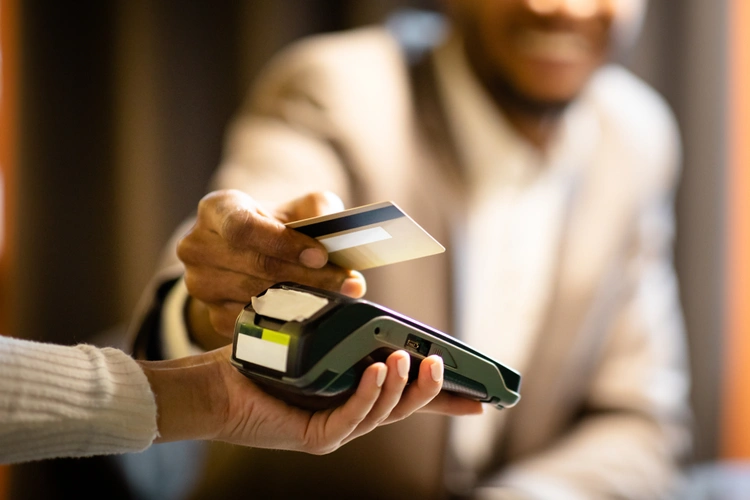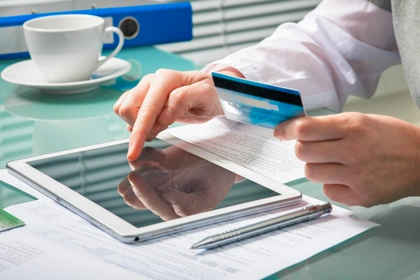How do business credit cards work?
Business credit cards work in a similar way to personal credit cards. They are both types of revolving credit that you can dip into and pay off as you wish, to cover the cost of goods and services. They both come with set credit limits, minimum repayment amounts, and interest is added if balances aren’t cleared in full each month.
However, there are some key differences between personal and business credit cards, including:
- business credit cards are designed for business purposes only – whereas personal credit cards are for personal spending
- business credit cards tend to come with higher credit limits and interest rates
- if used responsibly, business credit cards can help you build your business credit score, which can help you access better deals in the future – whereas personal credit cards don’t contribute towards your business credit score
- unlike personal credit cards, business credit cards aren’t protected by Section 75, which means if something goes wrong with a credit card purchase (e.g. it’s faulty or doesn’t arrive) you might find it more difficult to get a refund from your card issuer
What can you use your business credit cards for?
Business credit cards are designed to be used for business transactions and small purchases, such as:
- paying invoices
- purchasing equipment, (e.g. items of office furniture)
- travel expenses
- employee expenses
There are no specific rules on what you can and can’t use a business credit card for – except, of course, anything illegal, or personal expenses if you’re an employee with access to a business credit card.
Some of the main reasons small business owners opt for business credit cards include:
- they help you to manage cash flow
- they enable you to draw a firm line between your personal and business financial lives, which in turn can make them both easier to manage
- they also provide some protection against your personal finances in the event of something going wrong with your business
Can I use my business credit card for personal use?
The easiest (and short) answer to this is no. If you’re unsure whether you can use your business credit card for something, it’s probably best not to. However, it’s worth digging into this a bit more. To do this though, we need to separate the business credit card holders into two camps: the business owners and the employees.
Business owners
If you’re a small business owner and you have a business credit card, it’s at your discretion what you use that card for. It isn’t illegal to use a business credit card for a personal expense. The lender isn’t going to come after you if you use your business credit card instead of your personal one for your latte.
However, it’s important to remember that, if you’ve signed a personal guarantee, your business credit account is connected to you as an individual. So, if you run into trouble with your business credit card in terms of not being able to make your repayments, this is going to impact you as an individual. It can affect your personal credit score and potentially have even more serious repercussions.
It’s also important to consider that the benefit of a business credit card is the separation it provides from your personal finances. The blurrier you make that line by using them interchangeably, the harder it’ll be to manage your money effectively.
Employees
If you’re an employee with access to a business credit card, the short and easy answer is the only answer: you cannot and must not use your business credit card for your personal expenses.
Doing so could result in the loss of your job, as well as potential legal action from your employer. If you’re not sure if something counts as a business expense or not, check with the appropriate person in the business first.
What should you not put on your business credit card?
So, we know that you should avoid putting personal expenses on your business credit card – but what does that mean in practice? Here’s a quick list of some of the transactions you shouldn’t use your business credit card for.
Personal spending
We can’t say it enough: don’t use your business credit card (especially if you’re an employee) for personal spending. Whether that’s your bus fare, your new trainers, or your haircut, your business card should stay in your wallet unless you’re paying for an agreed business expense.
Expensive purchases
It may be that you need something expensive for your small business (like a new piece of machinery for example) and if you have the money on your business credit card, it can be tempting to spend it. But generally, it’s not a good idea to put expensive items on a business credit card. This is mainly because credit cards are designed for short-term purchases that don’t take a long time to pay off.
Salaries
Using a business credit card to pay salaries is never a good idea. Salaries are one of your largest and most expensive outgoings and using a business credit card is only going to make it more expensive, as you’ll be paying it back with interest. It’s also not very sustainable and could be a sign that your business is beginning to struggle financially.
Investments
Investments are long-term commitments as they can be volatile in the short term. Using business credit cards to fund them is a bad idea, as you can never guarantee you’ll get back what you put in – but you can guarantee that you’ll be charged interest on what you take out from your credit card.
Benefits of using a business credit card
Business credit cards, while they should be used with caution, can be a great way to help make your business finances more manageable. Other benefits include:
- higher credit limits compared to personal credit cards (though be careful not to borrow more than you need)
- potential to improve business credit score if used responsibly
- additional cards can be requested for employees if needed
- tailored rewards packages may be available (especially if you have a high credit score)
- separation of personal and business finances to make bookkeeping easier
Factors to consider before getting a business credit card
As with any kind of credit, you should carefully consider if it’s the right move for you and your business before getting a business credit card. Think about:
- if you can afford it – to avoid late fees, you’ll need to repay at least the minimum amount each month (to avoid interest you’d need to clear the balance in full)
- if you really need it – it isn’t worth getting one just for the sake of it
- the risks that go with it – if you’ve signed a personal guarantee, your business credit card is linked to you as an individual, which means your credit report can be affected
What are the alternatives to business credit cards?
If a business credit card isn’t right for you, there are other options. You could consider getting a business loan or charge card, for example.
If you need to purchase a high-ticket item, it may be worth considering getting a loan instead, as it may work out cheaper than a credit card, but you would need to do the sums to check this first.
Bear in mind that, unlike credit cards, charge cards require you to repay your balance every month.
Disclaimer: We make every effort to ensure content is correct when published. Information on this website doesn't constitute financial advice, and we aren't responsible for the content of any external sites.






